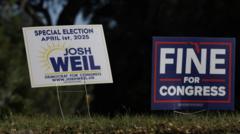### Summary: Facing high tariffs on exports to the EU and other markets, American companies urge the Trump administration to implement reciprocal tariffs, hoping to rectify trade inequalities. The uncertainty surrounding these tariffs poses risks of retaliation and economic pain, as businesses navigate their own interests with the broader implications of sweeping trade policies.
### Title: US Firms Push for Fair Trade Amidst Trump's Tariff Strategies

### Title: US Firms Push for Fair Trade Amidst Trump's Tariff Strategies
### Description: American businesses express mixed feelings about proposed tariffs aimed at leveling global trade imbalances as the White House prepares for responses.
In the aisles of US grocery stores, imported jams from Europe such as St Dalfour strawberry spread and Bonne Maman raspberry preserve dominate the market. These sugary spreads account for a significant portion of the $200 million in jams that the EU exports to America every year. Conversely, American-made jellies struggle to find their place in European stores, with exports to the region totaling under $300,000 annually due to steep import tariffs exceeding 24% on fruit spreads. JM Smucker, a leading US jam producer, attributes this disparity to the EU's high tariff regime and has petitioned the White House to consider implementing reciprocal tariffs on EU products as a solution, arguing that the US's maximum jam tariff is a mere 4.5%.
Global trade dynamics have been thrown into turmoil by Trump’s aggressive tariff strategies, which have sparked confusion and frustration among trading partners and raised concerns among economists over potential economic fallout like rising prices. While some US businesses echo these warnings, they also express long-standing grievances regarding unfair foreign competition and trade policies. JM Smucker's plea to the White House is just one of many, as businesses seek to highlight their specific concerns before the expected tariff announcement set for April 2.
Fruits and vegetables producers have highlighted the astounding tariff discrepancies they face in markets including India, Thailand, and Brazil. They, alongside streaming services, oil, and natural gas companies, have urged the administration to address various inequities in international trade regulations. As Trump advocates for these tariffs, branding the move as "Liberation Day," there remains a palpable anxiety among businesses about his unpredictable approach.
While some industries are eager for Trump to make tariff adjustments, they fear the consequences of broad measures that could provoke retaliatory tariffs or ignite a major trade war. Trump remains optimistic for the role of these tariffs in leveling the playing field, although the mixed optimism among firms suggests uncertainty regarding the outcome of these policies.
Trump's recent remarks indicated a “nice” approach even while planning to impose severe tariffs on foreign vehicles and parts. Analysts caution that those who hope his strategy will lead to broader negotiations may find that Trump might be as satisfied simply retaliating against perceived injustices.
The intricate dance businesses engage in is evident as companies like NorthStar BlueScope Steel and JM Smucker's representatives request specific tariff expansions while simultaneously appealing for exemptions that would benefit their operations.
Former Commerce Secretary Wilbur Ross noted that business concerns might lessen once the April plans unfold, as Trump has been vocal about his tariff strategies for years. Interestingly, support for these tactics remains prominent in the Republican party, despite the stock market's recent declines linked to trade tensions. As Representative Jodey Arrington stated, addressing tariffs now could ultimately level the trade playing field for American producers and workers in the long run. The ongoing trade debate underscores the complex relationships between domestic policies and global commerce, revealing the nuanced implications of tariff strategies in an interconnected economy.
Global trade dynamics have been thrown into turmoil by Trump’s aggressive tariff strategies, which have sparked confusion and frustration among trading partners and raised concerns among economists over potential economic fallout like rising prices. While some US businesses echo these warnings, they also express long-standing grievances regarding unfair foreign competition and trade policies. JM Smucker's plea to the White House is just one of many, as businesses seek to highlight their specific concerns before the expected tariff announcement set for April 2.
Fruits and vegetables producers have highlighted the astounding tariff discrepancies they face in markets including India, Thailand, and Brazil. They, alongside streaming services, oil, and natural gas companies, have urged the administration to address various inequities in international trade regulations. As Trump advocates for these tariffs, branding the move as "Liberation Day," there remains a palpable anxiety among businesses about his unpredictable approach.
While some industries are eager for Trump to make tariff adjustments, they fear the consequences of broad measures that could provoke retaliatory tariffs or ignite a major trade war. Trump remains optimistic for the role of these tariffs in leveling the playing field, although the mixed optimism among firms suggests uncertainty regarding the outcome of these policies.
Trump's recent remarks indicated a “nice” approach even while planning to impose severe tariffs on foreign vehicles and parts. Analysts caution that those who hope his strategy will lead to broader negotiations may find that Trump might be as satisfied simply retaliating against perceived injustices.
The intricate dance businesses engage in is evident as companies like NorthStar BlueScope Steel and JM Smucker's representatives request specific tariff expansions while simultaneously appealing for exemptions that would benefit their operations.
Former Commerce Secretary Wilbur Ross noted that business concerns might lessen once the April plans unfold, as Trump has been vocal about his tariff strategies for years. Interestingly, support for these tactics remains prominent in the Republican party, despite the stock market's recent declines linked to trade tensions. As Representative Jodey Arrington stated, addressing tariffs now could ultimately level the trade playing field for American producers and workers in the long run. The ongoing trade debate underscores the complex relationships between domestic policies and global commerce, revealing the nuanced implications of tariff strategies in an interconnected economy.






















